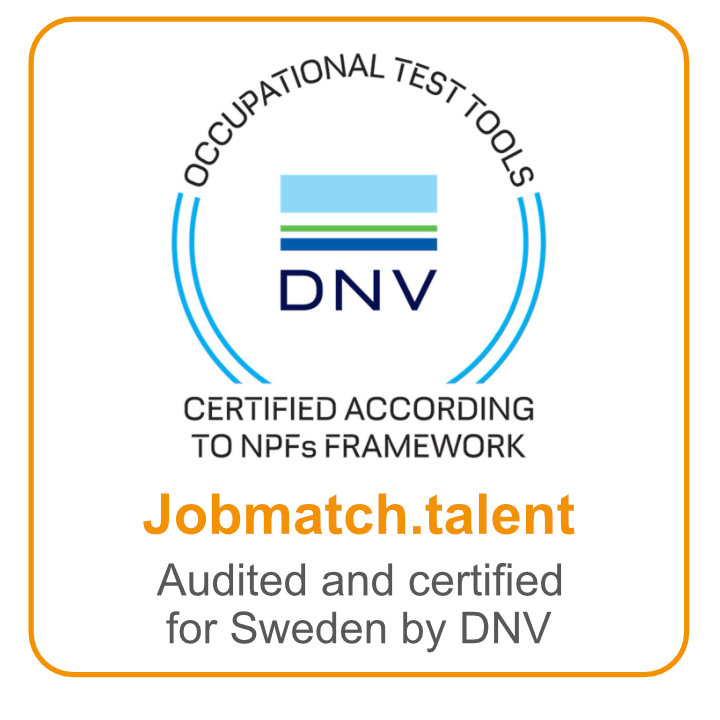The Right Talent for the Job
Jobmatch.talent - Personaldiagnostik für passgenaue Besetzung und gezielte EntwicklungAls erstes schwedisches Verfahren seiner Art wurde Jobmatch.talent von der weltweit führenden Zertifizierungsstelle DNV nach den neuen Richtlinien der EFPA (European Federation of Psychologists‘ Associations), qualitätsgeprüft und zertifiziert.
Unterschiedliche Studien und Dokumentationen belegen die wissenschaftlichen Aspekte; die Unterlagen liegen dabei größtenteils in schwedischer Sprache, aber auch in Englisch vor. Wir haben einige der wichtigsten Ergebnisse und Aspekte zusammengefasst.
Certified by DNV according to EFPA (European Federation of Psychologists‘ Associations)
The certification model was developed by a EFPA working group consisting of experts from different European countries. In addition to the requirement for evidence of alleged uses, the main focus is to inform test users about a theoretical, practical and psychological character of a test in a clearer and more complete way than before.
The Norska Veritas took over the examination and certification of psychological tests from the Foundation for Applied Psychology in April 2015, thus having certification responsibility in Norway and Sweden. In its reviews, DNV expires from the model issued by the European Psychology Federation in 2013. The new guidelines require, among other things, scientific evidence that the test can actually be used to what the supplier claims.
The certification guarantees that a test meets its stated purpose and that there is full backup-documentation.
The certification applies to the prediction of work performance, such as productive action, quality at work and collaborative ability. The different profiles to match the result against are not included in the certification, as these are variable.
Jobmatch.talent has thus undergone a thorough review of validity, reliability and other psychometric factors, and has been validated that the test meets the extensive requirements set by EFPA on psychological tests for predicting work performance.
Validity and norm group
Standards are the test results from a group of test takers selected as a reference group in evaluating and interpreting test results.
Jobmatch.talent’s standards are based on 12.702 test results from a reference group, 60% consisted of men and 40% of women. The average age was 41 years.
Reliability
Reliability is a measure of how stable a test result is over time (when the same individual is tested on multiple occasions). Does a test result show a snapshot or something more permanent? Three studies have been made to calculate the reliability from a few months up to several years.
The average correlation in the studies shows a correlation value of 0.7 – 0.9 which is very high. This means that the Jobmatch.talent result is long-term and reliable.
Validity
Validity is a test ability to measure the term it is intended to measure.
Jobmatch.talent’s validity has been investigated in terms of the four types of validity: content validity, construct validity, criterion validity, and ecological validity.
All four different validity studies clearly show a good validity. Bertil Mårdberg, PhD, Professor Emeritus has made an analysis of Jobmatch.talent’s predictive validity. Here he presents three values as R coefficients: 0.54, 0.70, 0.66. The mean of the predictive validity then becomes 0.63.
Predictive validity / criterion validity
Predictive validity is perhaps the most important form of validity, because it shows how well the test can predict job performance and work-related behavior.
If a test has good predictive validity it can be used for example as part of the recruitment process, as it allows to receive indications on how a person will perform before the person is hired.
In order to measure and document predictive validity, Bengt Jansson (Philosophy Doctor Associated with Gothenburg University with Psychology and Statistics as a specialty) conducted a scientific study of Jobmatch.talent’s predictive validity (see scientific report, Jansson, 2013).
The study was a head-assessment study (Supervisor Rating), where responsible executive managers had to assess employees‘ work and performance in 11 different areas, without the knowledge of their Jobmatch.talent results.
We received 280 responses associated with Jobmatch.talent results from the test takers, to see if there was a logical connection between what Jobmatch.talent results showed and how the managers had assessed the employees.
The result shows that there is clear and logical correlation between the managers‘ assessments and the Jobmatch.talent results.
Jobmatch.talent Scales Work Structure and Decision Character proved to be good predictors for structure and quality at work. The scales Tolerance and Relationship Orientation proved to be good predictors of interpersonal skills – assisted by scales Communication and Stress Pattern.
The Internal Driving, Activity, Forward, Action and Communication Scales appeared to be good predictors for productive action. This means that Jobmatch.talent has a good ability to predict employee performance on a particular job.
You want further details? Check out our studies about Jobmatch.talent.

